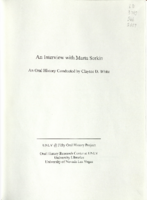Search the Special Collections and Archives Portal
Search Results

Transcript of interview with Jack Bullock by Julie Domonkos, March 15, 1981
Date
Archival Collection
Description
Text
African American Experience Community Scanning Day Photograph Collection
Identifier
Abstract
The African American Experience Community Scanning Day Photograph Collection (approximately 1958-1980, 2004) is comprised of digital surrogates of photographic prints and ephemera that document the experiences of the African American community in Las Vegas, Nevada. Materials were donated by members of the Las Vegas community as part of a community scanning day event hosted by the University of Nevada, Las Vegas's University Libraries in 2013.
Archival Collection
Daily Variety "Year In Show Biz Day By Day" magazine articles, 1951 to 1952
Level of Description
Archival Collection
Collection Name: Howard Hughes Film Production Records
Box/Folder: Box 376 (Restrictions apply)
Archival Component

Nora Mirabal interview, August 30, 2019: transcript
Date
Archival Collection
Description
Interviewed by Elsa Lopez and Barbara Tabach. Cuban refugee family by way of Spain and then to the US; arrived in Las Vegas in 1973 when Nora was 9 years old. Struggled in youth but rises up as embraces educaton. Currently is Assistant Director of Academic Partnership at CSN.
Text
Jesma and Carlyle Wilcox oral history interview
Identifier
Abstract
Oral history interview with Jesma and Carlyle Wilcox conducted by Sally Griffis on February 19, 1976 for the Ralph Roske Oral History Project on Early Las Vegas. Jesma Wilcox begins by describing her family ranch, how her father leased the property to tenants, and what it was like living without air conditioning and refrigeration. She describes using a nearby stream as a water source, recreational activities, and the Mormon settlers and missionaries who first settled on the ranch. Wilcox talks about her religious involvement with the Mormon Church and life in Las Vegas, Nevada during the mid-twentieth century, as well as how Las Vegas has changed. Wilcox, with her husband Carlyle, also discusses the history of the nuclear weapons tests. Carlyle then describes the construction of the Basic Magnesium Plant in Henderson, Nevada.
Archival Collection

Transcript of interview with Lamar Foremaster by Gregory Hall, February 14, 1979
Date
Archival Collection
Description
On February 14, 1979, Gregory M. Hall interviewed his coworker, LaMar Foremaster (born May 9th, 1907 in Alamo, Nevada) at his place of business, Anderson Dairy, in Las Vegas, Nevada. This interview covers the changes, growth, and development of Southern Nevada from 1907 to 1979. During the interview LaMar discusses the Old Ranch, Boulder Dam, Hoover Dam, Fremont Street and the Strip. He also talks about his religious ties to the Mormon Church and his political activities in Las Vegas.
Text

Transcript of interview with Marta Sorkin by Claytee White, March 2, 2009
Date
Archival Collection
Description
In this interview, conducted for the 50th anniversary of UNLV, Marta Sorkin discusses her family and her experience moving to California, and then to Las Vegas. Sorkin worked at the James R. Dickinson Library at UNLV and later in Lied Library, helping to implement and update various databases, and create displays on current topics. She briefly discusses her involvement with Hillel and the Jewish Federation of Las Vegas.
Marta Sorkin begins by reminiscing about her childhood in Far Rockaway Long Island, New York. She details the life her parents lived, which set an example for Marta and her two siblings. Through hard work, advanced education, and involvement in causes that were important to them, they created the template by which Marta lives her life. Marta describes her early work history, which included modeling, sales, library work, and working part time in her father's dry-cleaning plant. She and her daughter were living with her parents for a time in California, and they visited Las Vegas on weekends. It was during one of those visits that Marta met her second husband-to-be. They eventually married and decided to settle in Las Vegas. In Las Vegas, Marta enrolled at UNLV, became involved with the Preservation Association of Clark County, and volunteered at the Jewish Federation of Las Vegas. In addition, she completed her BA and MA degrees at UNLV and started working at the university's library. She details her work there, including creating display cases, working in the reference section, doing research for students and faculty, and compiling interviews. Marta also describes the fundraisers she spearheaded to help raise money for the various societies she was involved with: non-events, pancake breakfasts, dinners, and dance and band performances. In her closing comments she mentions an interview she did for Ralph Roske's class and expresses her appreciation for the career she's had at UNLV.
Text

Sara Kalaoram oral history interview: transcript
Date
Archival Collection
Description
Oral history interview with Sara Kalaoram conducted by Alexandra Arabshian on November 15, 2021 for Reflections: The Las Vegas Asian American and Pacific Islander Oral History Project. Sara Kalaoram shares her immigration story to the United States from Singapore in 2002 at the age of four. She talks about her upbringing in Las Vegas, Nevada, her education from Arizona State University, and her work with the Culinary Workers Union and with Assemblyman Steve Yeager as his campaign manager and executive assistant. Sara Kalaoram discusses cultural differences between Singapore and the United States, the immigration stories of her parents, and her experience as an Asian-American immigrant in the twenty-first century.
Text

Transcript of interview with Fred B. Houghton by Philip Partridge, February 9, 1975
Date
Archival Collection
Description
On February 9, 1975, Philip Partridge interviewed former attorney, Fred B. Houghton (born August 27th, 1894 in Chicago, Illinois) in his home in Las Vegas, Nevada. The two discuss how Houghton first moved to Las Vegas and how he came to practice law. The interview concludes with Houghton’s thoughts of Southern Nevada.
Text

Christian Chan oral history interview: transcript
Date
Archival Collection
Description
Oral history interview with Christian Chan conducted by Cecilia Winchell, Jerwin Tiu, and Stefani Evans on May 06, 2022 for the Reflections: the Las Vegas Asian American and Pacific Islander Oral History Project. In this interview, Chan begins by describing her childhood in Hong Kong and later moving to San Francisco, California with her family, then to Las Vegas, Nevada in 1965. She recalls attending Sunrise Acres and Roy Martin Middle School before graduating from Valley High School as valedictorian. In college, Chan attended the University of Nevada, Las Vegas (UNLV) and graduated with a degree in engineering. After college, she found work in the Las Vegas Valley Water District and became the first woman engineer. During her five years there, she excountered subtle sexism for the first time. Chan continues the interview by describing her work while she lived in California, as well as her years internationally living in the Philippines as well as Ecuador. Throughout the interview, Chan touches on topics ranging from identity, to her impressions of the different generations, discrimination, and the growth of Las Vegas.
Text
